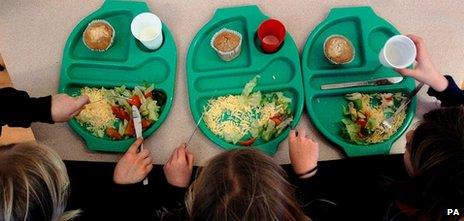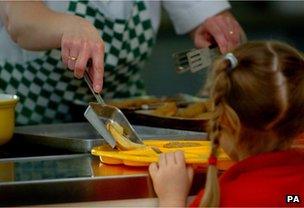Why simplifying free school meals is complex
- Published
- comments

The government has admitted it will "have to think hard" about how to ensure hundreds of thousands of England's poorest children don't lose out on free school meals when welfare payments are simplified from next year.
Ministers are realising that there is simply nothing simple about simplification.
The welfare state is a beast of bureaucracy - but its complexity is a product of attempting to achieve something massively complex. No two claimants are exactly alike and, over time, creative policy-makers have come up with all manner of ways of using the system to target cash to need.
One way to offer extra help to people on low incomes, for example, has been to attach additional support to recipients of benefits like income support, Jobseekers Allowance and tax credits.
All kinds of measures have been passported to those who really need them on the basis of income-based benefits:
free prescriptions
help with transport costs and utility bills
cold weather payments
vouchers for fruit and vegetables
and free school meals.
But when the individual benefits which trigger those payments start to disappear next year, absorbed into the new Universal Credit, there remains a large and emphatic question mark. How can you target support to the needy?
The Children's Society says children from poorer families could lose their free school meals
The coalition government's answer back in summer 2010, external was what it described as "a simpler and fairer system that bases entitlement on an income or earnings threshold". But it quickly transpired that manufacturing simplicity and fairness was easier said than done.
The following year ministers asked the collective brains of the Social Security Advisory Committee to look at the problem. They thought about the conundrum long and hard and sent their report to ministers last month, external.
The committee put forward what it called "a number of broad suggestions", but it was clear there was no cheap and simple solution that could be in place in time for the introduction of Universal Credit.
The government was forced to accept that "given the legislative and administrative change that would be required, radical reform of passported benefits may not be achievable for the initial stages of Universal Credit and that the first challenge will be for departments and organisations to review their entitlement criteria for 2013".
It is small wonder that lobby groups are trying to get a debate going. The Children's Society's warning that 350,000 of England's poorest children might lose their entitlement to free school meals are regarded as scaremongering by ministers, but the charity wants to use the moment to press for more families to get help.
The Department for Education is about to announce the terms of a consultation on what to do. But some campaigners fear their favoured option, giving free school meals to all families on Universal Credit, will not be even up for discussion.
Sarah Teather, the Children and Families Minister, has told me as much. "We are not going to be able to afford to do everything the Children's Society wants us to do because it is very expensive. But what I am very determined about is that those who are most in need will continue to receive free school meals."
The basic problem that ministers need to solve is the so-called cliff-edge: at the point a benefit is withdrawn, work doesn't make financial sense unless earnings are greater than the value of the lost welfare.

A recent Which? survey found school dinners cost parents between £1.20 to £2.50 a day
Under the current system, a system of tapered tax credits can lessen the impact. But a simple "earnings threshold" means that a family with three children on free school meals would need to earn at least £30 a week more simply to stay where they are.
Indeed, the new taper built into Universal Credit designed to ensure work always pays more than welfare actually makes the impact of losing free school meals even greater. Because welfare is reduced as incomes rise, parents will need to earn even more to cover the cost of losing a passported benefit.
The Children's Society calculates that a single mum with three children earning £7,500 a year would need to double their salary to break even.
No-one seriously argues the welfare system doesn't need urgent modernisation and simplification. But achieving such reform is not simple at all.